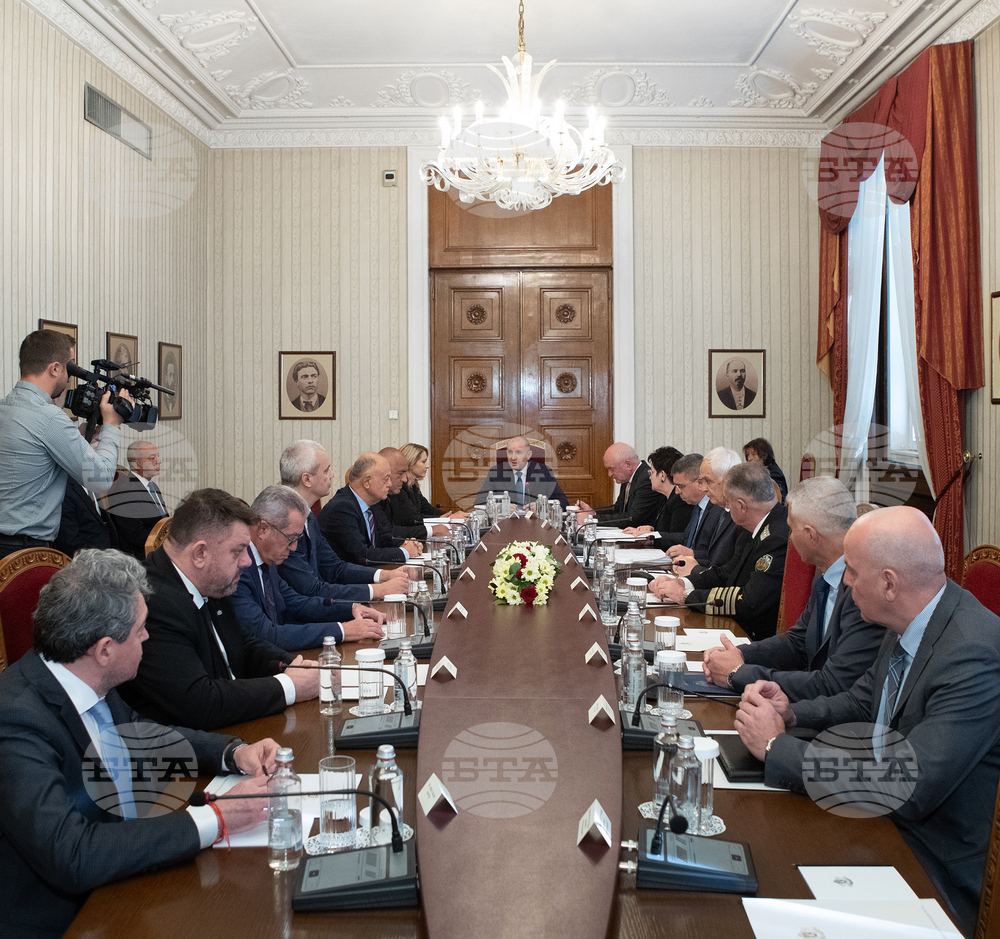site.btaConsultative Council on National Security under President Meets over Middle East Crisis, Sees No Direct Threat to Bulgaria at Present


The Consultative Council on National Security under President Rumen Radev met Friday to discuss the risks for Bulgaria in the context of the conflicts in the Middle East. Emerging from the meeting, the President told reporters the Council's conclusion is that there is no direct threat to the country at present. The Council believes that it is urgent to put an immediate end to hostilities and to make further efforts for dialogue and finding a peaceful solution, the President added.
The Consultative Council is an advisory body on national security matters and is chaired by the President. It includes the National Assembly Chair; the Prime Minister; the Minister of Defence; the Minister of the Interior; the Minister for Foreign Affairs; the Minister for Finance; the Chairman of the State Agency for National Security; the Chief of Defence; the Chairman of the Intelligence Agency; the Secretary of the Security Council; one representative from each parliamentary group. Depending on the issues discussed, other office-holders may be invited to participate.
The Friday meeting lasted three hours and was attended by representatives of all parliamentary forces, caretaker Prime Minister Dimitar Glavchev and National Assembly Chair Raya Nazaryan, the Chief of Defence, Admiral Emil Eftimov, caretaker Defence Minister Atanas Zapryanov, caretaker Interior Minister Atanas Ilkov, caretaker Finance Minister Lyudmila Petkova, Deputy Foreign Minister Elena Shekerletova, heads of security services and others.
All participants in the meeting expressed their concern about the escalation of armed clashes and the grave humanitarian crisis. "We join the calls of the international community for de-escalation, for refraining from the use of force and for avoiding the involvement of other countries, which would be a threat to peace not only regionally but also globally," the participants in the Council agreed.
The head of State said that the Council considers urgent the immediate cessation of hostilities and further efforts for dialogue and finding a peaceful way out of the situation based on the UN Security Council resolutions and international law. "After getting acquainted with the reports and the security services and the Interior Ministry, we came to the conclusion that there is no direct threat to our country at the moment," the President said. He added that the sharply deteriorated environment is generating risks that necessitates their continuous monitoring and taking preventive actions.
The President spoke of a heightened risk of growing migration flows to Bulgaria and the possibility of terrorist attacks.
Several recommendations for the executive power branch
In view of the developments in the situation in the Middle East, the Council made several recommendations to the Executive, the President said. First, strengthen the measures to prevent terrorist acts on the territory of the country, as well as against Bulgarian diplomatic missions and Bulgarian service persons in missions and operations abroad. Second, continue efforts to evacuate Bulgarian citizens from the region of the conflicts and secure the release the Bulgarians from the Galaxy Leader crew. Third, take additional measures to secure the state border and counter increased migratory pressure. Fourth, enhance cooperation with related security agencies to ensure timely and comprehensive monitoring of the security environment to counter terrorist threats. Fifth, update, if necessary, the national counter-terrorism plan and other relevant plans. Sixth, assess the economic risks facing the country, review strategic reserves and replenish them if necessary, the President said. This opinion and recommendations were adopted by a large majority, with only one Council member voting against.
Speaking to reporters after the Consultative Council’s meeting, caretaker Prime Minister Dimitar Glavchev said that there is potential danger of a migrant wave, but currently the flows are in their “normal size”. He pointed out that most of the migrants coming to Bulgaria are people from Afghanistan, Syria and Morocco.
In his words, the Council meeting passed in a "spirit of consensus, which is a good sign that the institutions are working together to solve the problems of the Bulgarian citizens".
Glavchev said that no Bulgarian people have sought to be evacuated from Iran; that 10 to 12 people will be evacuated from Lebanon later on Friday, and another 16 on Saturday, when the first wave of evacuation will be completed.
Vazrazhdane leader Kostadin Kostadinov told reporters after the meeting that his parliamentary group was the only one that did not support the Council's position, because they wanted the Council to have the same position as on the war in Ukraine: to condemn the aggressor. "We yet again notice that there is double standard, very significant hypocrisy, which could cost us a lot," Kostadinov commented. According to him, the Council's position should have read that Bulgaria does not accept unjustified aggression from one country towards another.
There Is Such a People Floor Leader Toshko Yordanov told reporters that the level of threat “is relative low but it does exist". Yordanov said that he had proposed to the Council that before the next state budget, the political parties in the 51st National Assembly should agree in advance on specific measures related to the field of security in order to make those happen.
/NF/
news.modal.header
news.modal.text